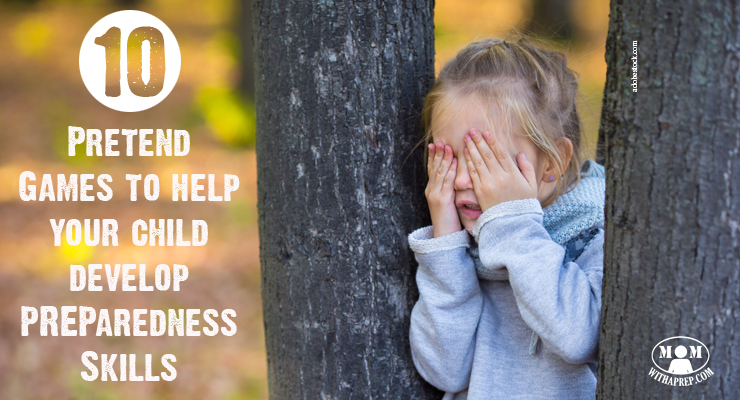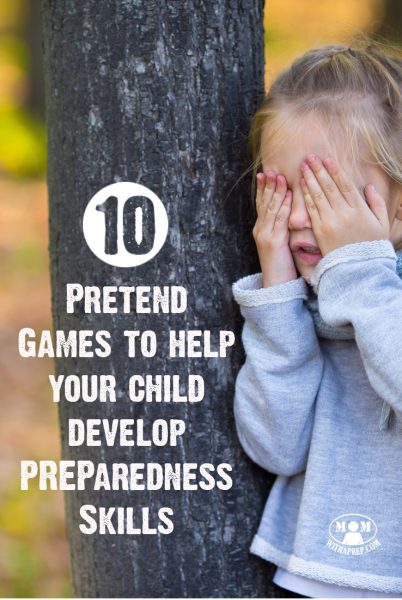Develop preparedness & survival skills in your children all the while having fun playing games! Get started with this list and let your imagination take you further…
Children learn through all sorts of ways, but one of the best reinforcers of knowledge is to put your new found skills to work in a real situation. However, not many of us have the means or the desire to set off a localized EMP or create a mini disaster for the benefit of teaching our kids field first aid or how to resist a mob or field strip an uzzi (and I hope you are reading that with the tongue-in-cheek voice that I’m typing it!), and pretend games can help in ways you don’t know!
Kids learn when they play. They learn to make decisions, they begin to put the knowledge they are accumulating to work, and they learn through practice. What better way to do all of this together than playing some “Let’s Pretend” games with the kids. You’re able to create scenarios that will help you teach them, will help them learn and have fun, all in a safe environment without the panic. Do it enough, and it becomes ingrained for those times when you might need to put those skills to the test.
10 Pretend Games to Help Your Children
Become More Prepared
Uh-oh! The Lights Out Game
Having the power go out during a storm tends to freak small children out, making it harder on them to be able to play this drill easily. So what about doing it one night when there’s no storm and no cause for them to be concerned. Turn the lights out one evening before dinner, and make sure everyone knows your power outage drill, cook supper on the grill, in the fireplace, or whatever other alternative methods you have (or do you have that planned out, yet?) Try not to open your fridge or freezer just as you would if this was a real-life situation like a storm outage. Play flashlight games in the backyard, read by firelight, sleep in sleeping bags in the living room.
Hey kids, let’s go on a picnic
This is a great time to put your Go-bag or 72-hour kit to the test. Grab your bags, head to the local park or field on foot or with a bike, and have a picnic and stay awhile. Do you have enough water to make it through a day or at least have a filter system to make use of available water found (and yes, even at the park, practice filtering the water from the fountains). Did you have enough food to make it through one meal (now multiply that by 9 to get you through 3 days – do you have enough?).
Skills Upgrade – This can be a good time to test them on how to actually use the items in their emergency bags.
Let’s go for a big walk
Much like the picnic idea, grab your pack and go for a hike. Travel over as many roads, trails, fields, yards as you can. Set up a mini-camp to take a rest, and then head out again.
Skills Upgrade: You can play the quiet game along some of the way, too.
Backyard Camp Out
Much like the Lights Out! game, a backyard camp out let’s you practice setting up tents, cooking over fires, using the potty outside, sleeping under the stars, and other skills in the relative safety of home.
Skills upgrade: Each time you do this activity, put more and more restrictions on relying on the comforts of home. Filter water from your water hose, use the food from your go bags.
We’re going on a road trip
You have 15 min to pack up everything you’ll need for being gone in an emergency. This can help you see where your preparations are weak and help train the kids to be ready at the drop of a hat in case something did happen. Then, reward the kids with a real trip away from home, even if it’s just for the day. (
Real life example: Imagine being in the situation that those in Fort McMurray wildfires are in, and see what some packed in the few brief moments they had. This is why play can be important to learn!
Hide and Seek
Hide and seek is an awesome pretend game for kids because they love the chase and the thrill of being hunted and being able to out smart their hunter. Have Mom or Dad teach the kids where the *REALLY* safe places are to hide in the house, and then have the other parent ‘hunt’ (remember…make it seem hard for you even though you know where the safe spots are).
Skill: This pretend can help reinforce where to hide if there is an intruder.
Backyard Olympics
Everyone loves a little healthy competition so set up a skills game series in your backyard. Make them survival and camping skills that your children can enjoy accomplishing allowing them to practice while still having fun doing it! They can work as teams or individuals. This site has great inspiration for you.
Skill: This pretend game allows your kids to begin thinking about useful skills ‘in the wild’.
Scavenger Hunt
This game can teach and reinforce foraging skills. Create cards with edible plant life in your landscape or neighborhood, tree or bird identification, track identification, navigation, or items that can be used to start fires (finding all the different kinds of natural kindling is great).
Hint: You can buy a pre-made set that fits both indoors and outdoors or you can make your own from free clip art on the web.
Where’s Home?
This was one of our favorite pretend games when our kids were small. While driving, we would have the children pretend to be taxi cab drivers and tell us how to get home. They learn navigational skills in a fun and useful way. You can do it while walking and have them pretend they are the tour guide and need to get everyone back home in time for snacks.
Skill upgrade: Once home, provide a map of the area you’ve traveled to give them a visual of what they’ve learned, and gradually upgrade them to some real map skills to use to navigate their way to a place they’ve never been before. Me on the Map is a great introduction to map skills for the Pre-K/early elementary set.
Playing Doctor
I loved it when our kids were young enough that playing doctor with their stuffed and animals and each other was the thing to pass away an hour or two. We’d break out bandages and slings and learn basic first aid that they could then practice as they played.
Skills upgrade: Take a first aid class together.
More ideas on Preparing for Kids
YOUR THOUGHTS? What other ways of play can you help encourage in your children that will help them build up their preparedness skills?

Katy Willis is a writer, lifelong homesteader, and master herbalist, master gardener, and canine nutritionist. Katy is a preparedness expert and modern homesteader practicing everyday preparedness, sustainability, and a holistic lifestyle.
She knows how important it is to be prepared for whatever life throws at you, because you just never know what's coming. And preparedness helps you give your family the best chance to thrive in any situation.
Katy is passionate about living naturally, growing food, keeping livestock, foraging, and making and using herbal remedies. Katy is an experienced herbalist and a member of the CMA (Complementary Medical Association).
Her preparedness skills go beyond just being "ready", she's ready to survive the initial disaster, and thrive afterward, too. She grows 100% organic food on roughly 15 acres and raises goats, chickens, and ducks. She also lovingly tends her orchard, where she grows many different fruit trees. And, because she likes to know exactly what she's feeding her family, she's a seasoned from-scratch cook and gluten-free baker.
Katy teaches foraging and environmental education classes, too, including self-sufficient living, modern homesteading, seed saving, and organic vegetable gardening.
Katy helps others learn forgotten skills, including basic survival skills and self-reliance.
She's been published on sites such as MSN, Angi, Home Advisor, Family Handyman, Wealth of Geeks, Readers Digest, and more.



